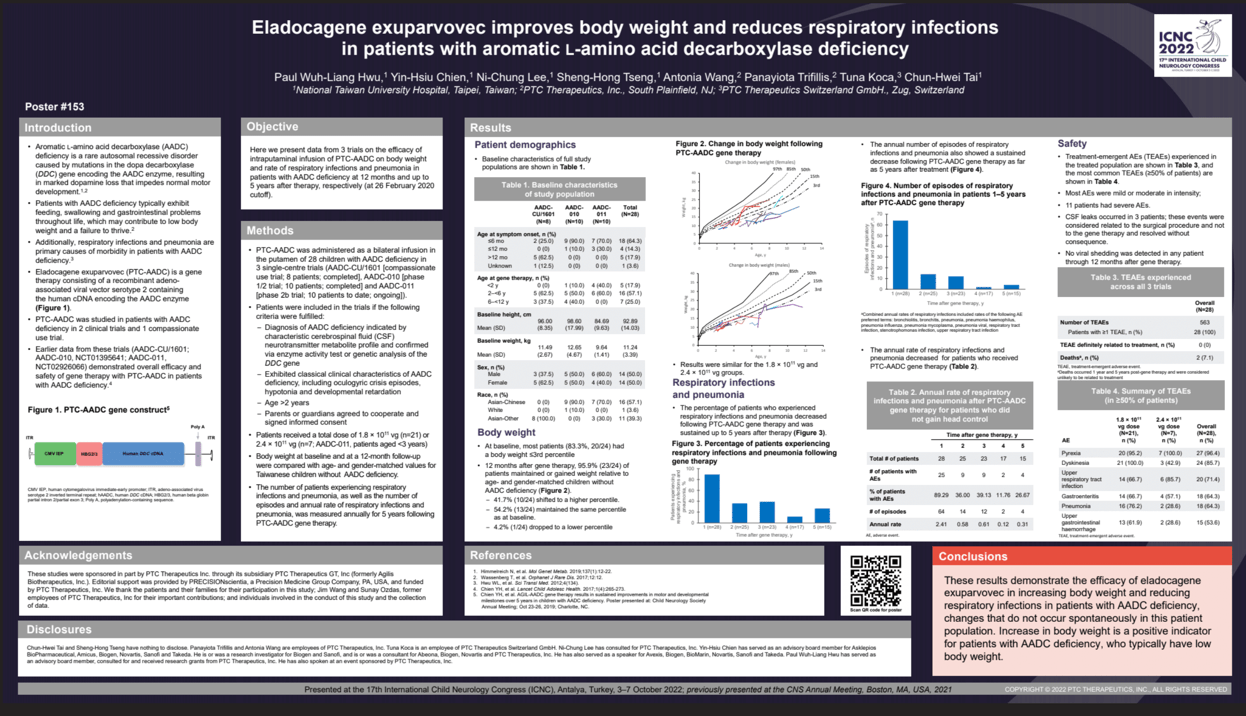Eladocagene exuparvovec improves body weight and reduces respiratory infections in patients with aromatic L-amino acid decarboxylase deficiency
Objectives: Aromatic L-amino acid decarboxylase (AADC) deficiency is caused by mutations in the dopa decarboxylase gene leading to reduced AADC enzyme activity. Patients with AADC deficiency often have feeding, swallowing, and gastrointestinal problems, which may contribute to low body weight. Upper respiratory tract infections (URTIs) and pneumonia are major causes of morbidity in these patients. Eladocagene exuparvovec is a recombinant adeno-associated viral vector carrying the coding sequence for the human AADC gene.
Methods: Eladocagene exuparvovec was administered via bilateral infusion into the putamen of 28 children with AADC deficiency in 3 clinical trials (AADC-CU/1601 [8 patients, completed], AADC-010 [10 patients, completed], and AADC-011 [10 patients at 26 Feb 2020 cutoff date, ongoing]). Patients received 1.8 × 10^11 vg (n=21) or 2.4 × 10^11 vg (n=7; AADC-011)]. Body weight was measured at baseline and at 12-month follow-up and compared with age- and gender-matched values for children without AADC deficiency. Rate of URTI/pneumonia was measured annually for 5 years after therapy.
Results: At baseline, most patients (83.3%, 20/24) had a body weight ≤3rd percentile. At 12 months, 95.9% maintained or gained weight relative to age- and gender-matched children without AADC deficiency; 42% (10/24) shifted to a higher percentile, and 54% (13/24) maintained the same percentile as at baseline. The annual rate of URTI/pneumonia decreased from 2.41 at 1 year after treatment to 0.31 at 5 years after treatment (Table 1).
Conclusions: These results demonstrate the efficacy of eladocagene exuparvovec in improving body weight and reducing respiratory infections in patients with AADC deficiency.
Keywords: Rare Diseases, AADC Deficiency, Gene Therapy, Movement Disorders
Paul Wuh-Liang Hwu
National Taiwan University Hospital and National Taiwan University College of Medicine
Taiwan
Yin-Hsiu Chien
National Taiwan University Hospital and National Taiwan University College of Medicine
Taiwan
Ni-Chung Lee
National Taiwan University Hospital and National Taiwan University College of Medicine
Taiwan
Sheng-Hong Tseng
National Taiwan University Hospital and National Taiwan University College of Medicine
Taiwan
Antonia Wang
PTC Therapeutics, Inc.
United States
Panayiota Trifillis
PTC Therapeutics, Inc.
United States
Tuna Koca
PTC Therapeutics, Inc.
Switzerland
Chun-Hwei Tai
National Taiwan University Hospital and National Taiwan University College of Medicine
Taiwan
Methods: Eladocagene exuparvovec was administered via bilateral infusion into the putamen of 28 children with AADC deficiency in 3 clinical trials (AADC-CU/1601 [8 patients, completed], AADC-010 [10 patients, completed], and AADC-011 [10 patients at 26 Feb 2020 cutoff date, ongoing]). Patients received 1.8 × 10^11 vg (n=21) or 2.4 × 10^11 vg (n=7; AADC-011)]. Body weight was measured at baseline and at 12-month follow-up and compared with age- and gender-matched values for children without AADC deficiency. Rate of URTI/pneumonia was measured annually for 5 years after therapy.
Results: At baseline, most patients (83.3%, 20/24) had a body weight ≤3rd percentile. At 12 months, 95.9% maintained or gained weight relative to age- and gender-matched children without AADC deficiency; 42% (10/24) shifted to a higher percentile, and 54% (13/24) maintained the same percentile as at baseline. The annual rate of URTI/pneumonia decreased from 2.41 at 1 year after treatment to 0.31 at 5 years after treatment (Table 1).
Conclusions: These results demonstrate the efficacy of eladocagene exuparvovec in improving body weight and reducing respiratory infections in patients with AADC deficiency.
Keywords: Rare Diseases, AADC Deficiency, Gene Therapy, Movement Disorders
Paul Wuh-Liang Hwu
National Taiwan University Hospital and National Taiwan University College of Medicine
Taiwan
Yin-Hsiu Chien
National Taiwan University Hospital and National Taiwan University College of Medicine
Taiwan
Ni-Chung Lee
National Taiwan University Hospital and National Taiwan University College of Medicine
Taiwan
Sheng-Hong Tseng
National Taiwan University Hospital and National Taiwan University College of Medicine
Taiwan
Antonia Wang
PTC Therapeutics, Inc.
United States
Panayiota Trifillis
PTC Therapeutics, Inc.
United States
Tuna Koca
PTC Therapeutics, Inc.
Switzerland
Chun-Hwei Tai
National Taiwan University Hospital and National Taiwan University College of Medicine
Taiwan

Tuna Koca,
Paul Wuh-Liang Hwu, Yin-Hsiu Chien, Ni-Chung Lee, Sheng-Hong Tseng, Antonia Wang, Panayiota Trifillis, Chun-Hwei Tai
Paul Wuh-Liang Hwu, Yin-Hsiu Chien, Ni-Chung Lee, Sheng-Hong Tseng, Antonia Wang, Panayiota Trifillis, Chun-Hwei Tai